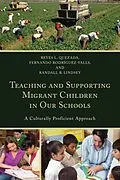General approaches to multiculturalism run the risk of overlooking an increasingly diverse student population that deserves special consideration and attention: students from immigrant backgrounds whose families toil the fields in order to provide better educational opportunities for their children. This book's purpose is to guide educators to think deeply about their roles and responsibilities in the education of children of farmworker families in our nation's schools. Readers will view their classrooms, schools, districts, and the migrant programs they lead in a broad and inclusive manner through the lens of cultural proficiency.
The initial steps when embracing cultural proficiency entails thinking reflectively about one's own values and behaviors and the school's policies and practices toward children of farmworker families. Cultivating a willingness, openness and commitment to meeting the challenges and opportunities of this often-invisible aspect of diversity is an important first step for the development of effective educational practices for migrant students and their families. The cultural proficiency framework can inform staff development models for working effectively with migrant students and their families.
Autorentext
Reyes L. Quezada is a professor in the Department of Learning and Teaching in the School of Leadership and Education Sciences where his research focus is in bilingual education, equity, cultural proficiency, parent involvement, international education, inclusion and diversity. Born in San Juan de Los Lagos, Jalisco, Mexico, he immigrated to the U.S at the age of seven. His father was a migrant farmworker who participated in the U.S. Bracero program (U.S. Guest Worker).
Inhalt
Foreword: Roger Rossenthal
Acknowledgments
PART I: Tools to Support Use of this book
Chapter 1: The Context in Educating Children of Migrant Farmworkers
Chapter 2: The Tools of Cultural Proficiency for Educator Use
Chapter 3: Learning Communities + Culturally Proficient Leadership = Students from Migrant Families Being Well Served
Chapter 4: Educators' Rubric for Inclusion and Support of Migrant Education Students, Families and Communities - Moving Beyond Rhetoric
PART II: Essential Elements
Chapter 5: Assessing Cultural Knowledge-From Self-Centered Learning to Socially Just Student- and Community-Asset LearningChapter 6: Valuing Diversity is Reflected in the Beliefs and Values You and Your School's Hold and How You Share those Beliefs and Values with Your Community
Chapter 7: Managing the Dynamics of Difference to Make a Difference
Chapter 8: Adapting to the Diversity as a Team in the Schools and Communities We Serve
Chapter 9: Institutionalizing Cultural Knowledge-for You, Your School, and the Migrant Communities You Serve
PART III: Next Steps
Chapter 10: Professional Communities Learning Together to Improve Migrant Student's Academic and Social Outcomes
Appendix: Resources in Support of Migrant Education
References
About the Authors
Index
